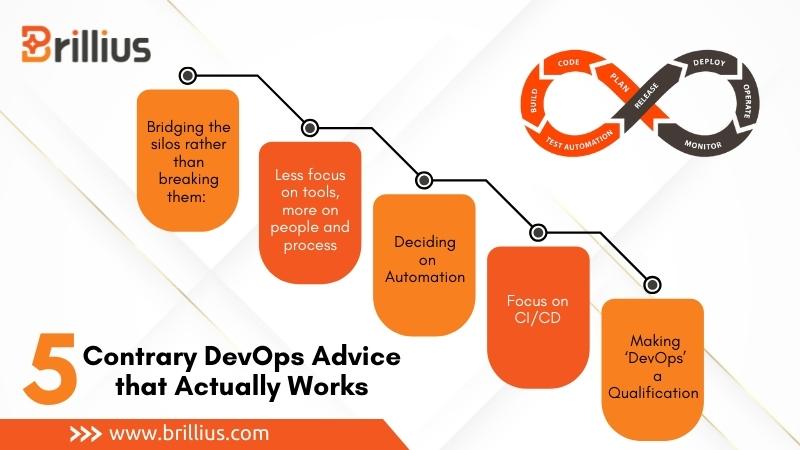DevOps is a widespread movement gaining popularity over the years. Naturally, the world of DevOps is filled with advice and guides on how-to, when-to, what-to, and so on. However, there are still a few pieces of contrary DevOps advice that may sound precarious but actually work well.
As per this 2022 State of DevOps report, many teams that have been following DevOps for eight or nine years still felt like they are only at the beginning. That’s because adopting automation and a full CI/CD pipeline can be a mammoth task for an organization. It is certainly not easy when there are all kinds of advice available and no way to identify which one would work in favor of the digital transformation journey.
Here are 5 contrary DevOps advice that may sound weird but can be helpful for your process.

Bridging the silos rather than breaking them:
No doubt, silos can be problematic in terms of creating a cohesive software delivery environment. But, breaking them is almost impossible to attain. Even when you have made the move to DevOps, there will be some cohesive groups rising from human interaction. So, rather than breaking the silos, the focus should be on bridging them through proper communication channels, tools, and a continuous feedback loop. Recognize the pain point when it comes to keeping the teams on sync when they may be functioning on different dynamics. Moreover, shift the focus towards optimizing the process flow rather than increasing the productivity of one team. Additionally, introducing agility to the whole process will enable you to maintain stability throughout.
Less focus on tools, more on people and process:
It is a wrong notion that DevOps means introducing a myriad of automation tools to your software delivery process. Well, the truth is, it is only a small part of it. Remember, DevOps is a philosophy. Hence, it is more about the people involved and the processes they follow rather than the tools they use. It can be challenging and take up a lot of effort to bring your teams, process, and tools on to the same page. To begin with, people in your team need to know, collaborate, and share responsibility. Next, the process of designing, building, and testing software should be well known to everyone in the team.
Deciding on Automation:
Not every testing needs to be automated. Nor do all your processes. A blend of automation and manual testing can help you redirect your resources strategically. It is important to understand your organizational requirements when it comes to development, testing, and delivery. Additionally, automating a bad process can cost you in the long run. First, identify if the process is right and then only proceed to automate it through tools. Lastly, after defining all the major and minor processes that need to be automated, figure out which tools are appropriate to use in your organizational setting.
Focus on CI/CD:
A proper continuous delivery and integration (CI/CD) can lead to great customer experiences. Get out of the notion that if you introduced enough tools, it will automatically streamline your CI/CD pipeline. Focus on how to add value by asking yourself the question, “what capabilities are we trying to build?”. Additionally, continuously measure the output and improve wherever necessary. Misinterpreting a metric can be worse than not measuring any at all. Also, don’t let your teams bypass the CI/CD pipeline in any scenario.
Making ‘DevOps’ a Qualification:
DevOps is not a qualification. It is not a course that you can complete and be an expert on. However, many companies do the mistake of looking to hire DevOps engineers when they decide to start their transformation. DevOps is a culmination of tools, cultural and organizational best practices that bring together the development, operation, quality, testing, and implementation team together to act cohesively towards a common goal. Putting together a ‘DevOps team’ to implement the methodology is not the right approach. The responsibility falls upon the leaders to align teams and bring their skills together to ensure a smooth software delivery pipeline tied together with open communication and a robust feedback channel. Of course, certain skills are knowledge of particular tools is important. But, is unfair to look for people with DevOps in their qualifications.
Hope you liked this blog. Are you looking to introduce digital transformation to your organization and want to get it right the first time? How about partnering with us. Contact us at info@brillius.com